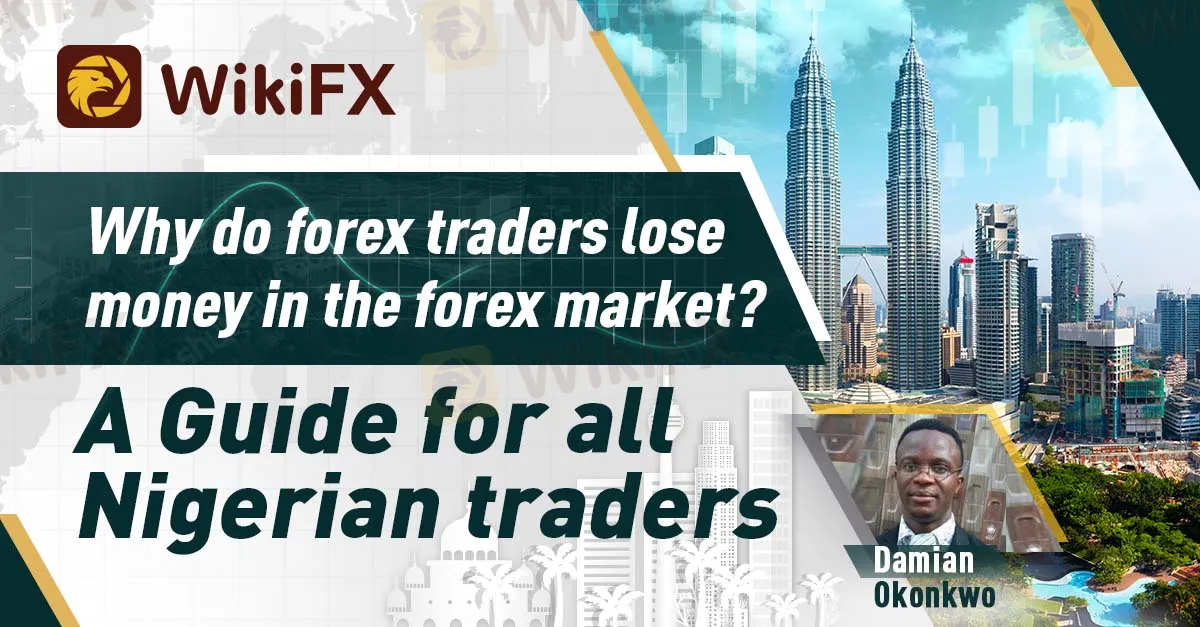简体中文
繁體中文
English
Pусский
日本語
ภาษาไทย
Tiếng Việt
Bahasa Indonesia
Español
हिन्दी
Filippiiniläinen
Français
Deutsch
Português
Türkçe
한국어
العربية
Why do forex traders lose money in the forex market? A Guide for all Nigerian traders
Abstract:The desire to make huge profits from little investment has been the major factor causing more loss for forex traders in the forex market today. Driven by the desire to make huge profits, some forex traders tend to neglect the need for proper risk management. Many proceed to use excessive lotsizes beyond their capitals to take positions in the market. The results is that they lose their capital in any incidence of high market volatility.

By: Damian Okonkwo

The desire to make huge profits from little investment has been the major factor causing more loss for forex traders in the forex market today. Driven by the desire to make huge profits, some forex traders tend to neglect the need for proper risk management. Many proceed to use excessive lotsizes beyond their capitals to take positions in the market. The results is that they lose their capital in any incidence of high market volatility. To make profits in the forex market requires discipline and a proper understanding of the structures that moves the market. Without this basic knowledge of the fundamental factors that cause volatility in the market, it will be all the more difficult to make profits in the forex market today.
Major reasons why forex traders lose money in the forex market today
A. Over-leveraging: The fact that forex brokers often provided enough leverage to traders for trading has often pushed some traders into choosing excessive lotsizes when taking positions in the market. This endangers their capital in cases of high market volatility especially when the market moves against their direction by a large pips difference.
B. Wrong predictions: Forex trading is largely speculative. None is sure of the market. Traders only predict the possible direction for the market over a period. However, there is no guarantee that the market will go in such a direction. Hence, traders tend to lose money when they make the wrong predictions and the market hits their set stoploss or when the loss equals their capital.
C. Market Manipulations: Some desk dealing brokers without proper regulations are known to manipulate the market, setting the market direction against the majority of their clients. It is therefore very necessary for every forex trader to ensure that he trades with a regulated and trusted forex broker.
D. Poor trading strategy: The strategy used for trading by a given trader often determines the number of profits he makes from his trades. A poor trading strategy could bring the trader more loss than any other factor. Traders are therefore expected to develop excellent trading strategies to help them maximize their profits.
E. Little Capital: Very often, some traders tend to begin their trading experience with very little capital often below $100.00. This is very risky as the trader tends to use the same lotsize for a $100 account to trade other accounts below $100.

Disclaimer:
The views in this article only represent the author's personal views, and do not constitute investment advice on this platform. This platform does not guarantee the accuracy, completeness and timeliness of the information in the article, and will not be liable for any loss caused by the use of or reliance on the information in the article.
Read more

Navigating the Intersection of Forex Markets, AI Technology, and Fintech
The financial world is transforming, driven by the rapid integration of artificial intelligence (AI) and innovative fintech solutions. This change is most apparent in forex markets, where algorithmic trading and deep learning are redefining strategies, risk management, and decision-making. In this article, we explore how AI-driven technologies are not only revolutionizing forex trading but are also propelling fintech innovations that enhance customer experiences, bolster security, and unlock new market opportunities.

The One Fear That’s Costing You More Than Just Profits
The fear of missing out (FOMO) is NOT what you think it is! Read the three lesser-discussed components that contribute greatly to FOMO trading!

Unlocking the Power of Algo Trading: Benefits and Limitation
Algorithmic trading merges speed, data, and automation—but can it outsmart human intuition and market chaos? Explore its power and pitfalls.

SocialFi and the Forex Market: A New Era for Decentralized Social Trading?
The worlds of social media and decentralized finance (DeFi) have converged under a new banner—SocialFi. Short for “Social Finance,” SocialFi leverages blockchain technology to reward user engagement, giving individuals direct control over their data and interactions. While SocialFi has primarily emerged in the context of content creation and crypto communities, its principles could soon revolutionize the forex market by reshaping how traders share insights and monetize social influence.
WikiFX Broker
Latest News
Why Are Financial Firms Adopting Stablecoins to Enhance Services and Stability?
Experienced Forex Traders Usually Do This Before Making a Lot of Money
Octa vs XM:Face-Off: A Detailed Comparison
When High Returns Go Wrong: How a Finance Manager Lost RM364,000
Bridging Trust, Exploring Best—WikiEXPO Hong Kong 2025 Wraps Up Spectacularly
Interactive Brokers Expands Crypto Trading with Solana, XRP, Cardano, and Dogecoin
Fidelity Investments Explores Stablecoin Innovation in Digital Assets Sector
Why More People Are Trading Online Today?
SEC Ends Crypto.com Probe, No Action Taken by Regulator
Broker Comparison: FXTM vs XM
Currency Calculator







